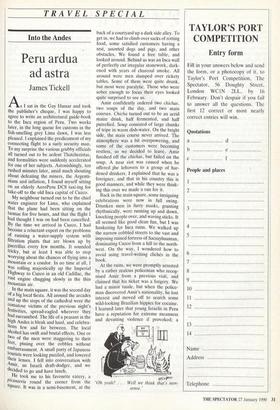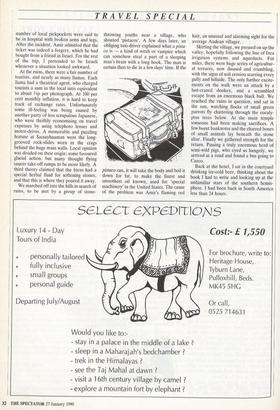TRAVEL SPECIAL
Into the Andes
Peru ardua ad astra
James Tickell
My neighbour turned out to be the chief water engineer for Lima, who explained that the plane had been sitting on the tarmac for five hours, and that the flight I had thought I was on had been cancelled. By the time we arrived in Cuzco, I had become a reluctant expert on the problems Of running a water-supply system with filtration plants that are blown up by guerrillas every few months. It sounded tricky, but at least I was able to stop worrying about the chances of flying into a Mountain or a condor. In no time at all, I was rolling majestically up the Imperial Highway to Cuzco in an old Cadillac, the vast engine chugging slowly in the thin Mountain air.
In the main square, it was the second day Of a big local fiesta. All around the arcades and up the steps of the cathedral were the comatose victims of the previous night's festivities, spread-eagled wherever they had succumbed. The life of a peasant in the high Andes is bleak and hard, and celebra- tions few and far between. The local alcohol has swift and brutal effects. One or two of the men were staggering to their feet, pissing over the cobbles without embarrassment. A small party of Japanese tourists were looking puzzled, and lowered their lenses. I fell into conversation with Amir, an Israeli draft-dodger, and we decided to go and have lunch. He took me to his favourite eatery, a Picanteria round the corner from the square. It was in a semi-basement, at the
back of a courtyard up a dark side alley. To get in, we had to climb over sacks of rotting food, some satisfied customers having a rest, assorted dogs and pigs, and other obstacles. We found a free table, and looked around. Behind us was an Inca wall of perfectly cut irregular stonework, dark- ened with years of charcoal smoke. All around were men slumped over rickety tables. Some of them were quite drunk, but most were paralytic. Those who were sober enough to focus their eyes looked quite surprised to see us.
Amir confidently ordered two chichas, two soups of the day, and two main courses. Chicha turned out to be an acrid maize drink, half fermented, and half putrefied. Soup consisted of large chunks of tripe in warm dish-water. On the bright side, the main course never arrived. The atmosphere was a bit overpowering, and some of the customers were becoming restless, so we decided to leave. Amir finished off the chichas, but failed on the soup. A near riot was caused when he offered he leftovers to a group of har- dened drinkers. I explained that he was a foreigner, and that in his country this is good manners, and while they were think- ing this over we made a run for it.
Back in the main square, some intriguing celebrations were now in full swing. Drunken men in furry masks, grunting rhythmically, were running up and down, knocking people over, and waving sticks. It all seemed like good clean fun, but I was hankering for Inca ruins. We walked up the narrow cobbled streets to the vast and imposing ruined fortress of Sacsayhuaman, dominating Cuzco from a hill to the north- west. On the way, I wondered how to avoid using travel-writing cliches in the book.
At the ruins, we were promptly arrested by a rather zealous policeman who recog- nised Amir from a previous visit, and claimed that his ticket was a forgery. We had a minor tussle, but when the police- man discovered Amir's nationality, he lost interest and moved off to search some wild-looking Brazilian hippies for cocaine.
I learned later that young Israelis in Peru have a reputation for extreme meanness and devasting violence if provoked; a
'Oh yeah? Well we think that's non-
sense.'
TRAVEL SPECIAL
number of local pickpockets were said to be in hospital with broken arms and legs. After the incident, Amir admitted that the ticket was indeed a forgery, which he had bought from a friend in Israel. For the rest of the trip, I pretended to be Israeli whenever a situation looked awkward.
At the ruins, there were a fair number of tourists, and nearly as many llamas. Each llama had a theatrical agent, who charged tourists a sum in the local intis equivalent to about 1/4p per photograph. At 100 per cent monthly inflation, it is hard to keep track of exchange rates. Unfortunately some ill-feeling was being caused by another party of less scrupulous Japanese, who were thriftily economising on travel expenses by using telephoto lenses and motor-drives. A memorable and puzzling feature at Sacsayhuaman were the long- grooved rock-slides worn in the crags behind the huge main walls. Local opinion was divided on their origin; some favoured glacial action, but many thought flying saucer take-off ramps to be more likely. A third theory claimed that the Incas had a special herbal fluid for softening stones, and that this is where they poured it away.
We marched off into the hills in search of ruins, to be met by a group of stone-
throwing youths near a village, who shouted `pistacos'. A few days later, an obliging taxi-driver explained what a pista- co is — a kind of witch or vampire which can somehow steal a part of a sleeping man's brain with a long book. The man is certain then to die in a few days' time. If the pistaco can, it will take the body and boil it down for fat, to make the finest and smoothest oil known, used for 'special machinery' in the United States. The cause of the problem was Amir's flaming red
hair, an unusual and alarming sight for the average Andean villager.
Skirting the village, we pressed on up the valley, hopefully following the line of Inca irrigation systems and aqueducts. For miles, there were huge series of agricultur- al terraces, now disused and crumbling, with the signs of soil erosion scarring every gully and hillside. The only further excite- ments on the walk were an attack by a lust-crazed donkey, and a scrambled escape from an enormous black bull. We reached the ruins in question, and sat in the sun, watching flocks of small green parrots fly chattering through the eucaly- ptus trees below. At the main temple someone had been making sacrifices. A few burnt banknotes and the charred bones of small animals lay beneath the stone altar. Finally we gathered strength for the return. Passing a truly enormous herd of semi-wild pigs, who eyed us hungrily, we arrived at a road and found a bus going to Cuzco.
Back at the hotel, I sat in the courtyard drinking ice-cold beer, thinking about the book I had to write and looking up at the unfamiliar stars of the southern hemis- phere. I had been back in South America less than 24 hours.



























































 Previous page
Previous page